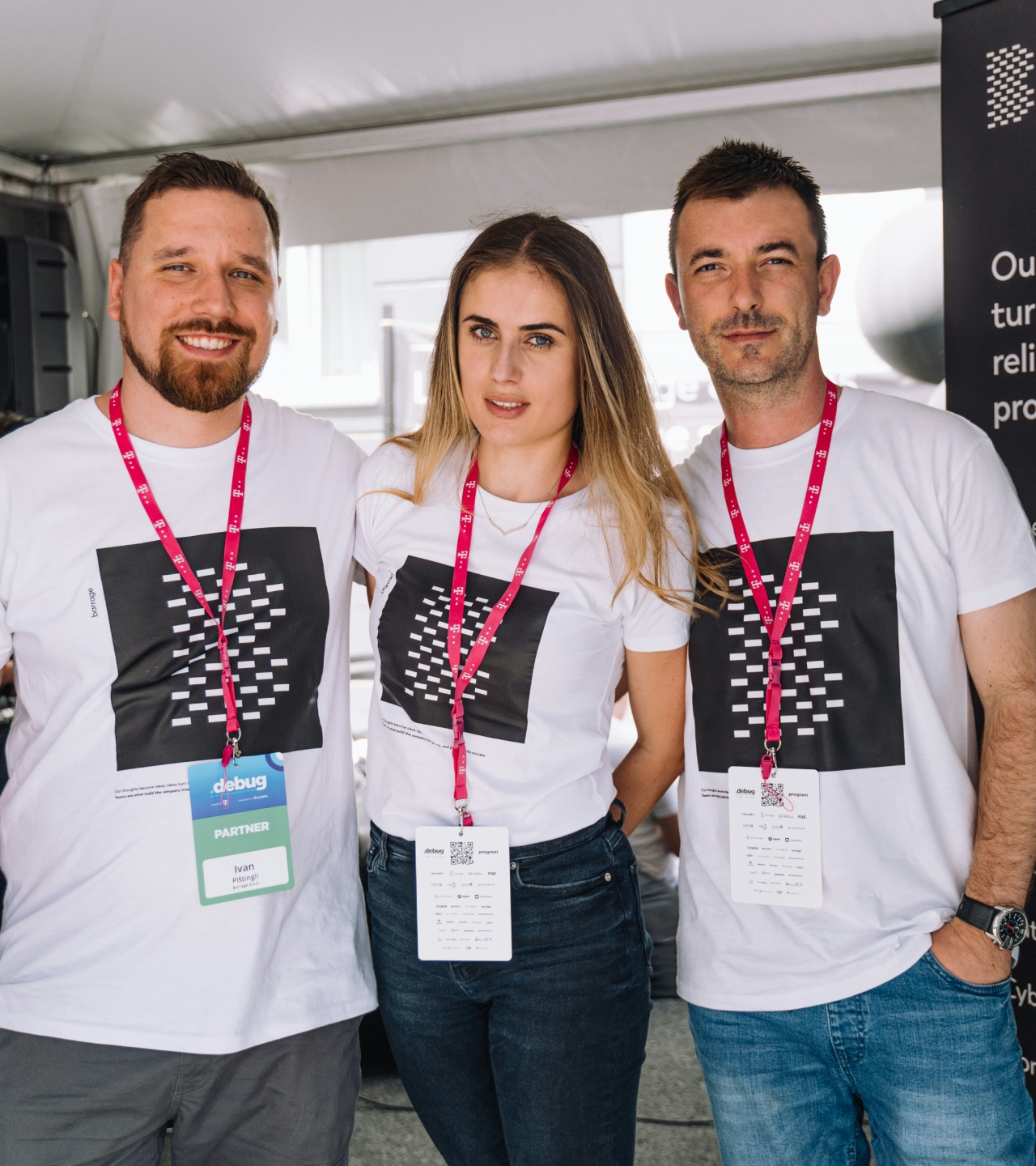
A guide to preparing for the IT conference season
Conferences… fun to attend but challenging to manage. How to know which ones are worth attending and who to send to ensure your company benefits from the event? This guide has all the tips and tricks you’ll need.
One of the best ways to keep up to date with trends in the IT world is to attend conferences. And after a couple of years of virtual conferences and even canceled events, in 2022, many organizations returned to holding in-person gatherings, while some opted for hybrid events.
Every industry has events where you need to be present if you want to follow the latest trends. To stay up to date with news in the IT industry, you must focus on a few (dozen) events worldwide to ensure you don’t miss anything. It is also essential to know what goals you want to achieve: you may want to learn something new, network or find a new client. The best events are those where you can combine 2 of 3 of these things, but if you can make 3 of 3, that's great!
As most know, the IT industry is divided into many niches and subcategories, which amounts to a considerable number of potential conferences. So, you need to have a great plan of where you want to go and what goals you want to achieve there. Without that, you can be lost.
This blog aims to give you tips and tricks on dealing with everything associated with event management and how to prepare for an "event season" when it arrives.
Begin with the end goal
Searching for "events in the IT industry" on Google will bring up over 100 results, and if you don't have focus, you will spend a lot of money without achieving anything significant.
When I came to the IT world, I was surprised by the number of events that exist, and I simply didn't know where to start. So, the first step was to clarify:
- which events/conferences are the best choice for us and
- what goals we want to achieve there.
The first thing I did was to create a list of conferences that were interesting to us, which I compiled in cooperation with developers, designers, and management so that we could make traveling and other arrangements. During the year, we have planned to visit more than 25 events worldwide. Some events are intended for developers, some for investors, and some for employer branding. We have divided the events into three crucial categories: talent attraction, business opportunities, and professional conferences. Each type has its target group with which we communicate differently.
Talent attraction - in this case, we focus on employer branding and communicating with students, professors, mentors, etc. Events like these allow us to get closer to the students, present the practical workplace training we offer, and promote our brand. At such events, we often have the opportunity to give presentations and speeches, and we are happy to respond. The added value we get as a lecturer is the possibility of future collaboration with the audience. Furthermore, the lecture itself confirms our expertise in that field. These events provide an excellent opportunity to reach out to many students who would be good candidates for our company. We can also network with educational institutions to influence the direction of education for young people and make them more accessible to the IT industry labor market.
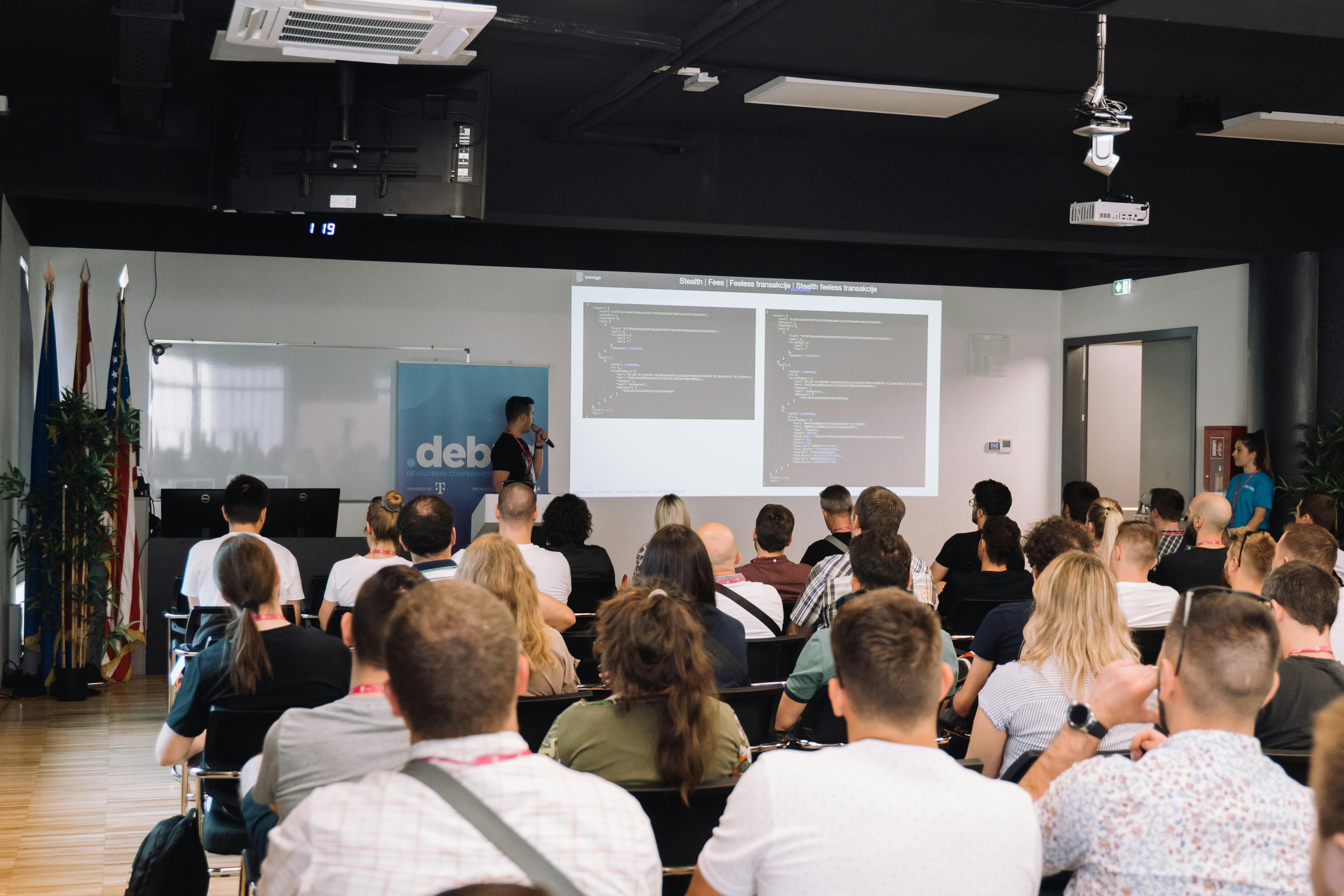
Our Karlo mesmerizing the crowd with feeless transactions
Business opportunities - almost every event is also a business opportunity if one knows what they are doing. But here, the focus is exclusively on investments, networking and creating new opportunities. These events are popular because the networking opportunities are bountiful, and you never know who you will meet. To be clear, in these events, it will rarely happen that one immediately achieves cooperation. The most important thing is establishing the first contact; collaboration usually happens a few months after the event.
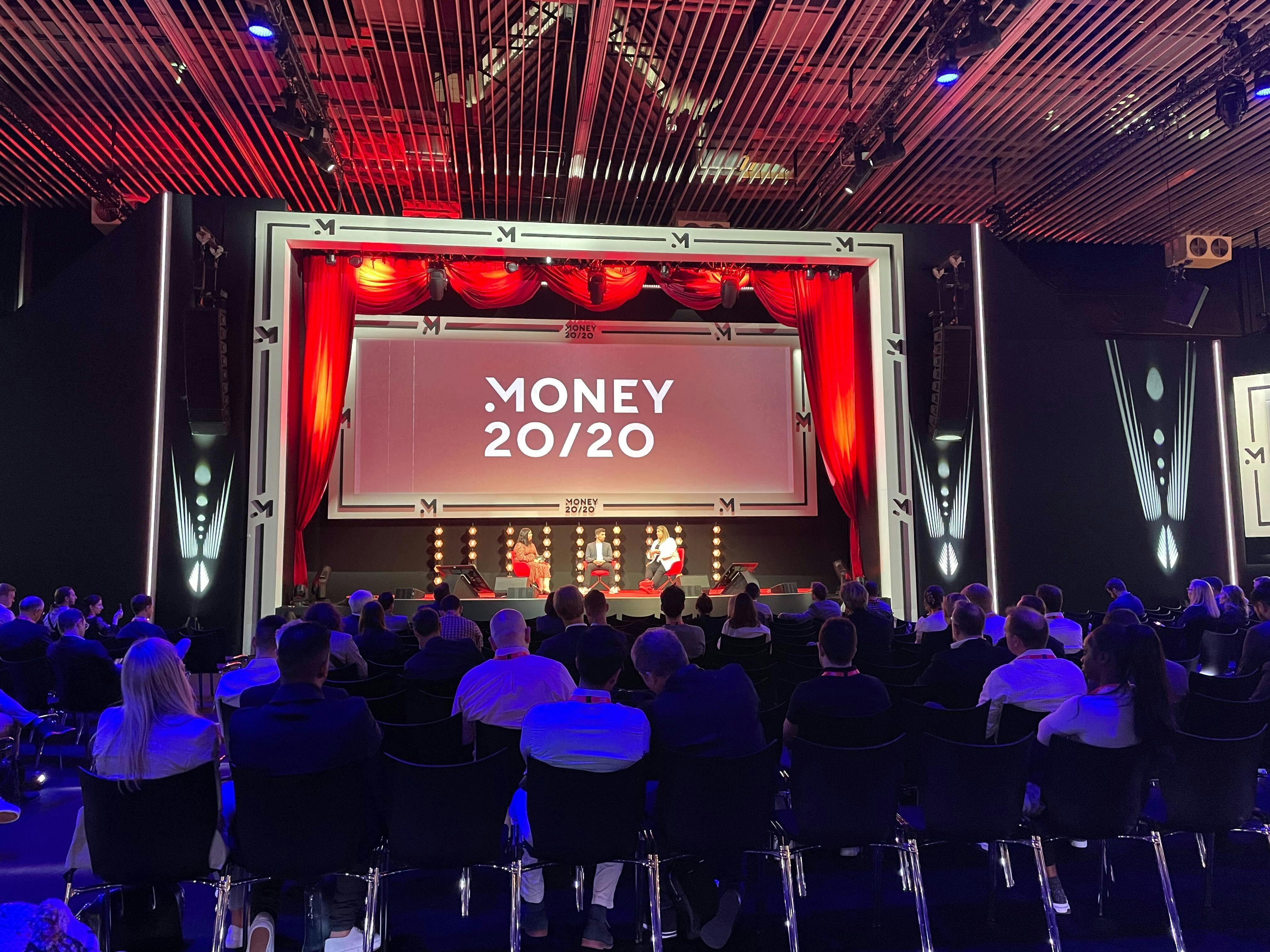
Talking business at the Money 20/20 in Amsterdam
And last but not least - professional conferences. Here we are talking about specialized conferences from a specific area - software development, design, blockchain, etc. The most crucial thing about these events is to learn something new. Those who attend such events are primarily engineers, programmers, or designers. Of course, even here, networking is essential, but not to the extent of the two previous examples.
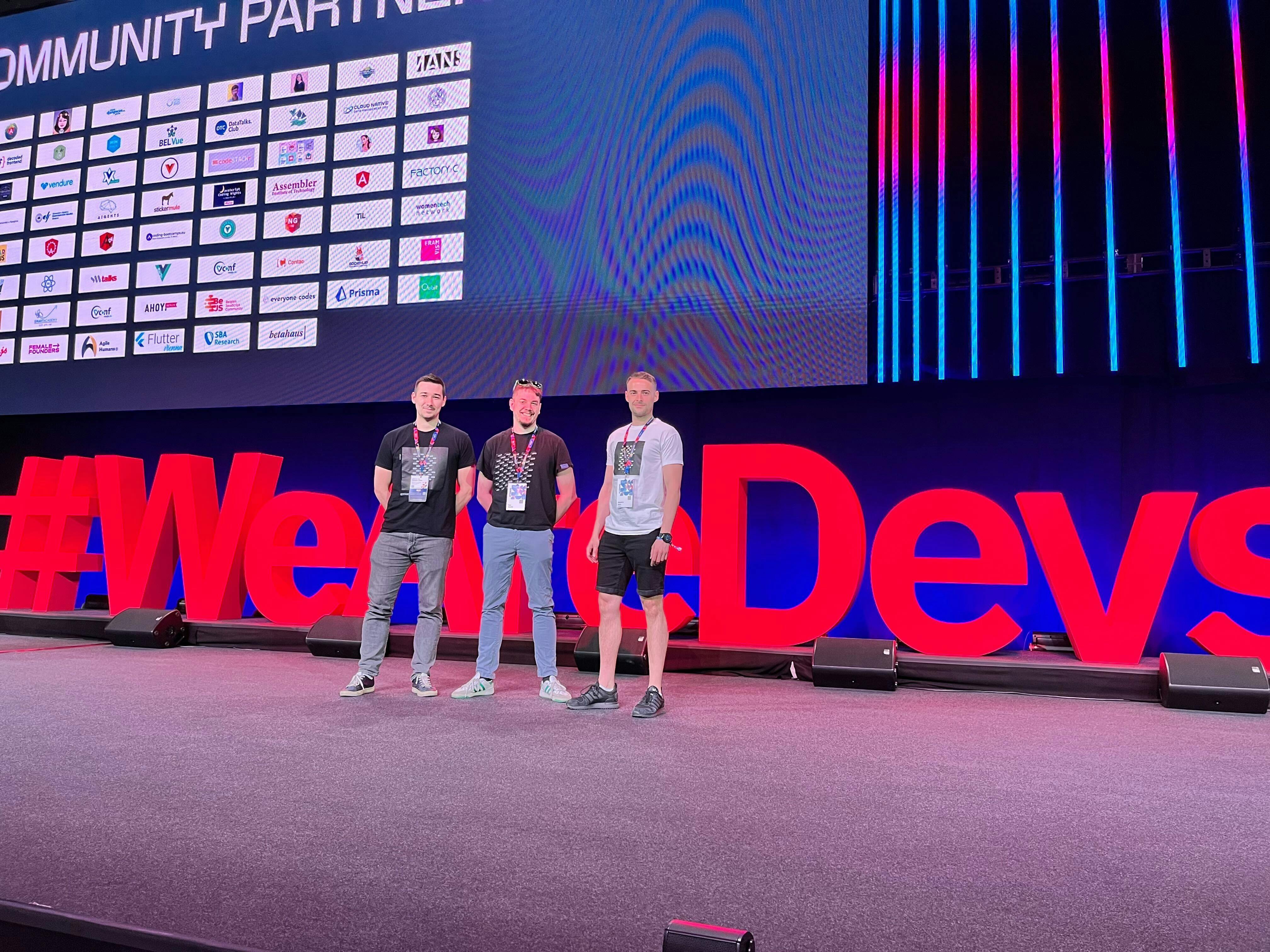
"We are developers" conference in Berlin
Each example has advantages you should know in advance and prepare for. Before attending such events, all employees must be familiar with the dress code, what to communicate, and the expected conduct. But before we go to the part related to that, we have to decide which of the employees will go to which event and prepare them for it.
Choose the attendees carefully
How do you decide who goes to which conference when you have over 100 employees, as is the case with us? Yes, there should be some way of evaluating such things. At Barrage, we have a list of employees who are brand ambassadors (they are people with strong communication skills who are part of the developing, design, business development, and marketing teams...). At each event, there must be at least one person whose task is networking. If it's about talent attraction events, we always try to send someone who studied at a similar or the same university we are visiting. If it is a business development event, we usually send either someone from the management or the business development department. Still, if it is a professional conference, we’ll want employees from the area to attend.
For each event, it is crucial to carefully plan the people who will visit it in advance because it must not happen that the project suffers due to someone's departure. Therefore, we always try to resolve such matters as soon as possible. Of course, we always look for as many people from different spheres as possible to visit an event to cover all the areas we are engaged in.
There are always people whose contributions have earned them a chance to attend a conference that interests them. In Barrage, we consider this and include them in the list.
Tend to the administrative part
Each event has preparatory tasks that need to be done so that everything is ready on time and there are no blockers. If they happen, they need to be solved as soon as possible.
People who attend the events must be informed on time to finish everything they need on their current projects and/or appoint a replacement who will hold the fort until they are back. At the same time, it’s necessary to send the attendees list to the organizers. In addition, the social media team must plan marketing activities related to each event. Finally, the most important thing - you need to order all promotional materials in advance, so they are ready to be handed out on the day of the conference.
Every experienced marketer knows that promo materials are always late. And, no. This is not a joke.
Don’t forget the promo materials
At every event, especially when we talk about talent attraction, promo materials are something that attracts students. At Barrage, we always strive to be original and interesting to be remembered. And, as you will notice, we are doing very well.
In addition to standard brochures and notebooks, we made our rakija (a brandy-like drink) with the unique name "Tears of engineers" and paper tissues with the meaningful message "You can always code and cry". What's interesting is that this message is the result of the onset of a complex project, where our team faced challenge after challenge and felt like all they could do is "sit down and cry". Of course, the team resolved every obstacle and came out stronger because of it. In time, this turned into an internal joke, so we decided to turn this into something useful for our struggling developers.
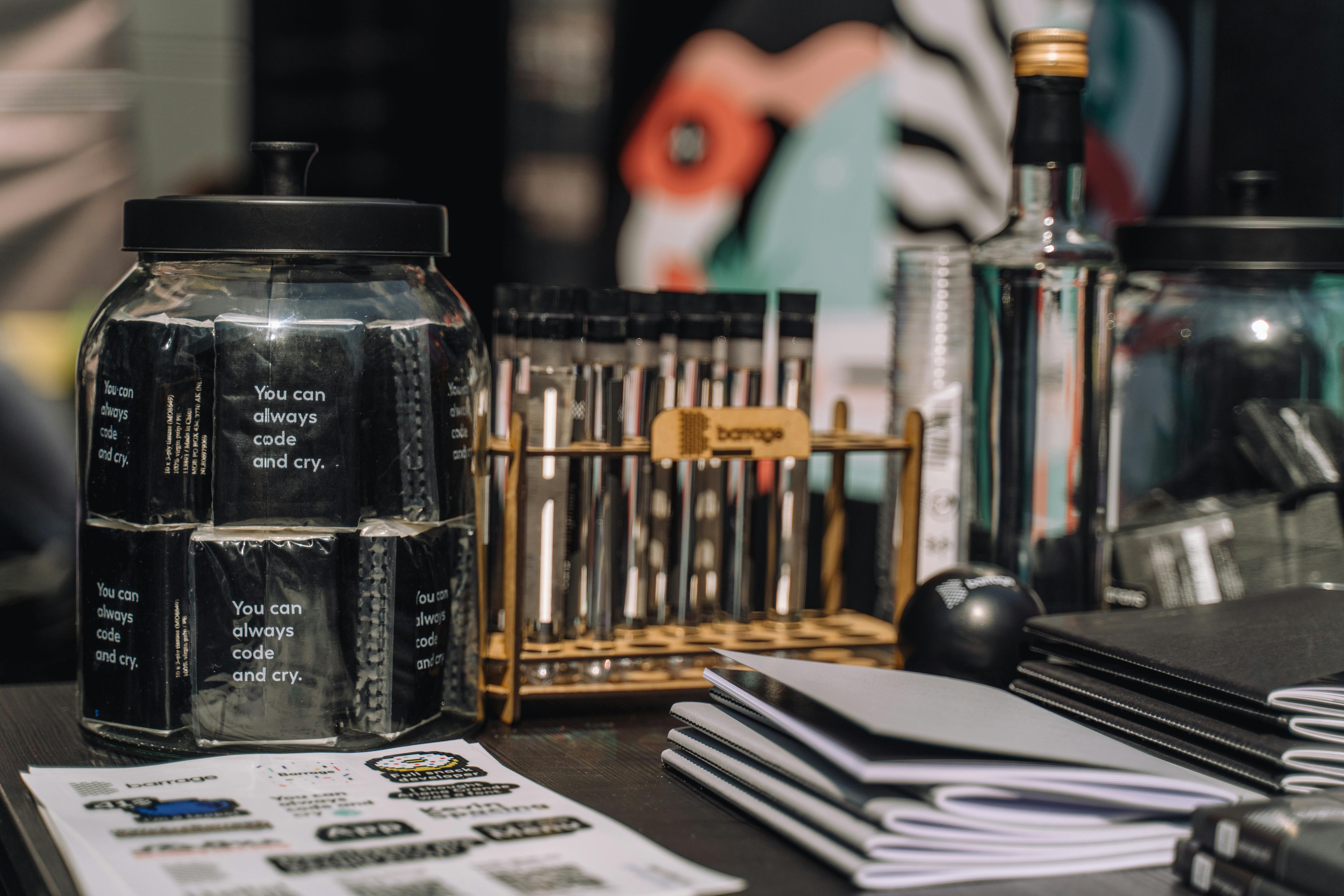
You can always code and cry
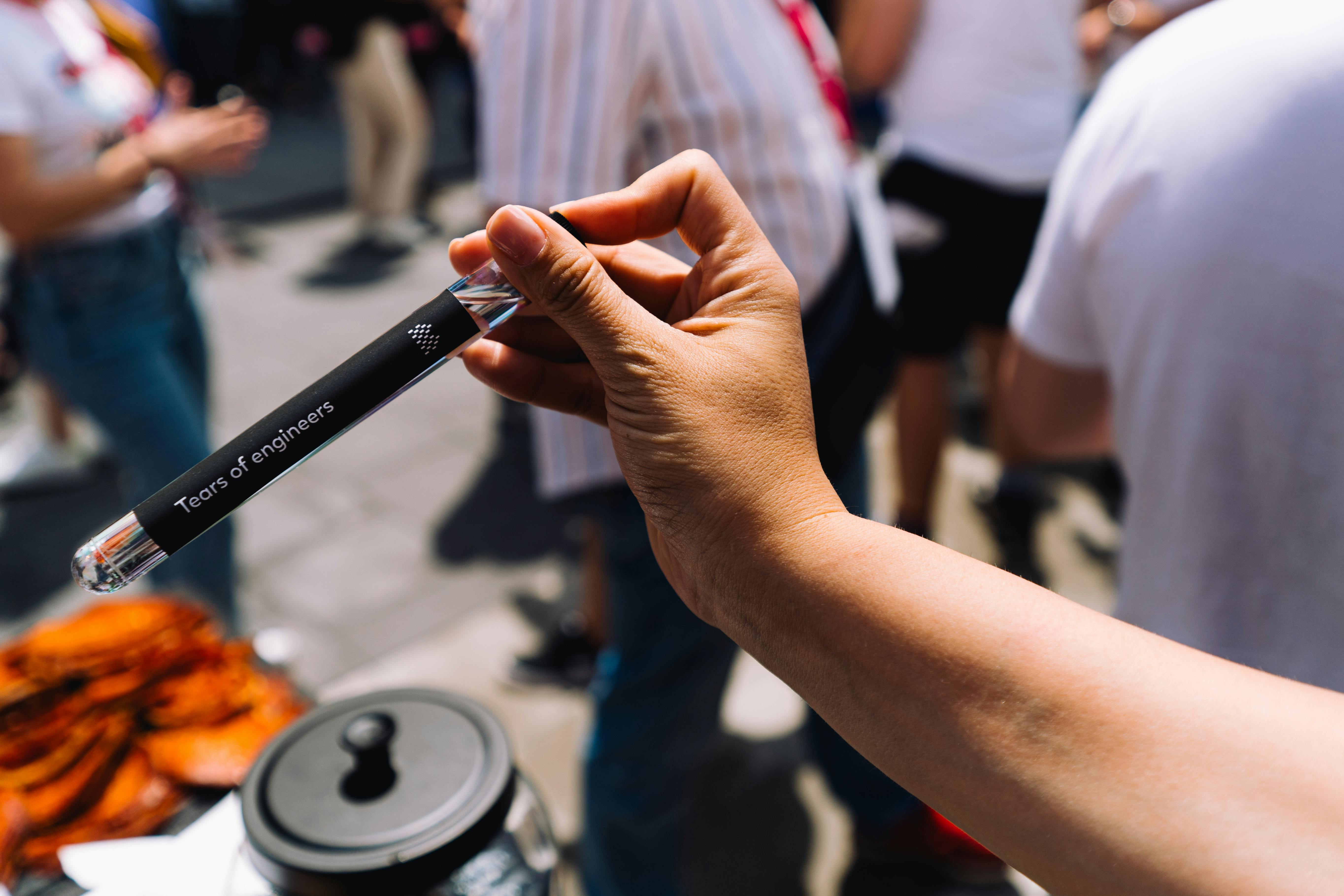
Engineers’ tears in a vial
But, before all that happens, you need to know what you will order, when and from whom. I am lucky because, at my previous place of work, I worked a lot with promotional materials, but at the same time, I established good relations with many suppliers. Because of that, I quickly found good offers and information regarding promo materials.
For all of you new to the event industry, I suggest you google it. Explore everything that is offered. There are a lot of things on the internet. At the same time, ask your colleagues what they would like to receive at an event, what they need and if any small items are currently a hit. For example, we at Barrage created a table with suggestions for promotional materials, and I was delighted with the ideas given to me by the developers. Many may be introverted, but they know what would be helpful and interesting to their fellow developers.
When you come up with the ideas for the materials, determine the quantities needed for all the events you have selected in advance and order. Always order ahead of time because you never know exactly how much time the supplier will need.
You don't want to go to the events without any promotional materials.
I would like to add that we live in an electronic age, and you should never disregard such media - screens that can play your presentation or a video about the company. It's a great way to keep the attention and stand out from the crowd. Visitors like something different, so why not give it to them?
Pics or it didn’t happen
If you are not on the internet, you don't exist.
Today, it is easier than ever to be visible, and you should use that. There are many social media platforms, so you can use the one that best conveys your message and voice.
Every event you go to must be accompanied by social media posts. So you never know who will see your post, and at the same time, you will show that you are always up to date with the latest trends. Nowadays, you can be at an event and tweet about it, share your opinion, and discuss specific topics live.
I assume every company has someone responsible for social media, so that person should put every event in the SM plan, advise visitors on what they need to deliver, and ensure event communication follows the company's business philosophy. For every event, a company needs one person dedicated to making photos, videos, and other materials from the event. If you have someone who likes to create content among those who went to the event, that's great.
If you don't have anyone willing to do it and want to help promote it through social networks, I advise hiring a professional photographer for significant events. We have partnered with one such external photographer for events of great importance to us in order to have excellent materials for social networks and other needs — this video is an example of great content we’ve created in one such collaboration.
But when we don't have a professional photographer, we are left to our own devices. Most of the time, those who visit the events often forget to take pictures and make videos, or if they do, their focus and quality are not that good. That is why we at Barrage have guidelines for photos and videos. I advise you to make it and distribute it in time because you never know when you will need it.
Ensure attendees have all the info
When we have defined who goes to which event, it is necessary to share all the information with everyone involved in the process.
We use Slack groups for communication and coordination. No later than two weeks before the event, we open a new channel for everyone involved in the event we are going to (visitors, travel organizers, social media, designers...) to receive all the necessary information about the event in time:
- the name of the event
- date and duration
- the place of the event
- URL
- info about the event itself
- who our representatives are, and how we participate (sponsors, visitors, partners, panelists, or something else)
- list of promo materials
- documents with all instructions for photography, dress code, and communication for events
- miscellaneous (some useful information about the event)
In addition to the Slack group, it is necessary to add events to the Google calendar, which is used to keep track of events throughout the year.
Keep an eye on the budget
One of the most sensitive elements comes toward the end, but that question must be defined at the beginning of each year so that you know what you have at your disposal so that you can decide where to go and which sponsorship packages to choose.
After defining the budget, planning events, and attending them, it is necessary to keep a table with expenses to know how much you spent on a specific event. After each event, it’s important to listen to the visitors' feedback and decide whether it makes sense to go again or not. Basically, you add up the costs and visitors' perceptions, which must be supported by arguments (did we achieve what we wanted - attracted new talents, established cooperation with new clients, attracted investors, etc.).
I keep track of all expenses in google sheets. I have a list of all events, promo materials arranged by event, additional costs (travel, accommodation), ticket costs, etc.
When assessing whether to go to the same event the following year, it is necessary to see all the advantages and disadvantages and decide on the future. Maybe the event isn't what we expected, it's not the domain we're involved in, or we haven't correctly assessed what we can achieve.
It is much better to visit fewer events where we will be satisfied with the achieved result than to wander around events, spend money and come back with nothing useful for the company.
Take continuous action
This is a task that never ends.
It is necessary to constantly research events, evaluate, and add (or move) to the plan for next year. When one event ends, it is necessary to plan the next one, coordinate teams, take care of promotional materials, communicate with the organizers, and prepare materials that we will use in the future.
When we finish one year, we must evaluate all the events for the next year and the arguments for or against them.
The best part of this job is that you are never bored, that there are so many events that we can go to and explore endlessly.
The only problem is that it’s easy to lose track of the goals, so it’s always necessary to have the Board’s or management’s expectations in mind.
A checklist to rule them all
As already mentioned, the IT industry keeps growing and developing year after year; thus, the number of events also increases. The positive thing about the pandemic is that now all events automatically have their online version. This is why it is possible to be a part of a big event without spending resources such as time and money on traveling and accommodation — of course, this is applicable only if we primarily want to learn something or hear the news. If our goal is networking and establishing new collaborations, we attend events personally. To know what is happening and be informed about the IT industry, it’s best to make a list of all the events that interest you.
So here's a checklist to help you organize your event trips:
- at the end of the year, do a recap of all the past year's events (feedback, expenses, promotional materials costs, etc.)
- plan events for the following year
- select representatives
- ensure administrative tasks are taken care of
- plan promotional materials
- plan social media activities
- pay special attention to coordination
- monitor your budget
- continually review and improve the process
Every company has its ways of functioning, as well as its wishes, and ideas about the organization and the outcome of the event events, but in general - the list is adaptable, and you can use it for any industry. The most important thing is that you have a goal you're aiming for, be it networking, education, or something else. Without a goal, you will be lost, and that's the last thing you want.
Your take on the subject
They say knowledge has power only if you pass it on - we hope our blog post gave you valuable insight.
If you want to share your opinion or see all the knowledge our team picked up on conferences in action, feel free to contact us. We'd love to hear what you have to say!